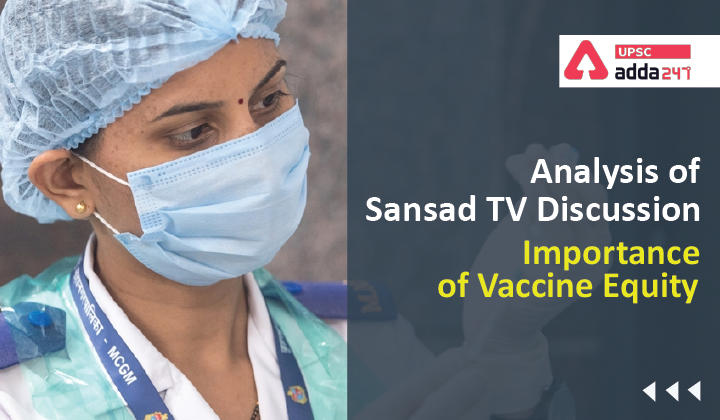Table of Contents
Introduction
- It has been two years since COVID-19 took hold and inequitable vaccine distribution remains a critical issue.
- The recent data highlight that amongst global low-income countries, only 4.2 per cent of the total population is fully vaccinated. Population vaccination proportions for middle- and high-income countries were a median of 35 per cent and 70 per cent, respectively.
- High-income countries now have vaccination rates that are well above 60%, and their programmes to deliver booster vaccinations have accelerated exponentially in light of the Omicron variant.
- However, when we look at the rest of the world, the distribution of vaccines and supplies to some of the poorest countries has been badly delayed.
What is vaccine equity?
- Vaccine equity acknowledges that no nation, state, or individual’s life is more important or more deserving than another’s.
- In contrast, vaccine nationalism and protectionism harm the most vulnerable children and families around the world.
- For countries that have more vaccines than they need to share with others need to work together to ensure global vaccine supply meets global demand – because no one is safe until everyone is safe.
Why Is Vaccine Equity so Important?
- According to the World Health Organization (WHO), the mentality of vaccine nationalism puts the world on the brink of “catastrophic moral failure.”
- But the inequitable distribution of the COVID-19 vaccine on the global sphere isn’t just an issue of morals or ethics. When it comes to an infectious disease that does not respect borders, COVID-19 and emerging variants such as Omicron will continue to be a threat to the international community as long as it exists anywhere in the world.
- Vaccine nationalism only helps the virus propagate and in order for a vaccine to work, we need most of society to be protected — and that protection happens when everyone gets vaccinated. So you need to roll this out to everyone because, inherently, that’s how we protect everyone collectively.
- Especially with the appearance of new variants in the context of the current COVID-19 pandemic, the more people left unvaccinated, the bigger and potentially more severe the collective risk.
How can we ensure COVID-19 vaccine equity?
- The COVID-19 Vaccine Global Access Facility, known as COVAX Facility was established to help drive global vaccine equity and access. Funding is vital, but money alone will not deliver vaccines for all.
- Donors should commit sufficient resources to fund COVAX to support the rollout of vaccines in low-income countries, as well as vaccine delivery in humanitarian contexts.
- Beyond equitable distribution on the global scale, individual countries also face the issue of unequal access to the vaccine among their own populations. Just as high-income countries can hoard vaccines for their citizens, wealthy individuals can use their purchasing power to get priority access if no guidelines are implemented.
- Manufacturers should ensure full transparency around the distribution and development of COVID-19 vaccines, including clinical trial data, cost of R&D and prices.
Vaccine equity in the Indo-Pacific
- The Indo-Pacific region is home to more than half a dozen countries that are classified as low-income and low-middle income. These low- and low-middle-income countries also account for a higher population share in the region.
- As many countries in the Indo-Pacific struggle to meet their vaccination targets, India could spearhead a vaccine initiative in close collaboration with other players to ensure vaccine equity in the region.
- The Quad—a group of like-minded democracies comprising India, Japan, Australia and the United States (US)—is seen to be one of the foremost groupings in the Indo-Pacific region. The Quad leaders need to include vaccine equity—both inter and intra nation—in their healthcare mandate for the Indo-Pacific region.
Conclusion
Vaccine equity will accelerate the end of the pandemic. Achieving WHO’s vaccine equity targets will substantially increase population immunity globally, protect health systems, enable economies to fully restart, and reduce the risk of new variants emerging.



 TSPSC Group 1 Question Paper 2024, Downl...
TSPSC Group 1 Question Paper 2024, Downl...
 TSPSC Group 1 Answer key 2024 Out, Downl...
TSPSC Group 1 Answer key 2024 Out, Downl...
 UPSC Prelims 2024 Question Paper, Downlo...
UPSC Prelims 2024 Question Paper, Downlo...
